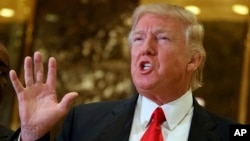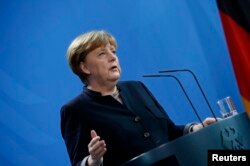German Chancellor Angela Merkel promised Monday to seek agreement with U.S. President-elect Donald Trump once he is sworn in later this week, but insisted that Europe will chart its own path forward in spite of differences with the incoming American leader.
Merkel's comments came in response to a weekend interview in which Trump alarmed some European leaders by repeating longstanding criticisms of the NATO alliance and suggesting Germany's response to the European migration crisis had been a historic mistake.
"I think that we Europeans have our destiny in our own hands and I would very strongly argue that we all stand together," Merkel said of the 27 European Union members that will remain after Britain's departure.
Speaking at a press conference in Berlin, she said the EU members will work together on "fighting against terrorism, securing the external borders of the European Union and ensuring internal security and also working for a truly digital single market, for creating jobs."
She added that Trump's views on Europe are well known. "The president-elect has outlined his views, so once he is in office - which he isn't at this point in time - we will cooperate obviously with the new American administration and we will then see what sort of accord we can achieve."
Speaking wtih The Times of London and Germany's Bild newspaper, Trump had said on Sunday that NATO is obsolete "because it was designed many, many years ago." He also repeated his complaint, frequently voiced during the election campaign, that NATO "countries aren't paying what they're supposed to pay."
Earlier Monday, German Foreign Minister Frank-Walter Steinmeier said Trump's comments prompted "surprise and anxiety" among NATO member countries. "We have to wait and see what will be the consequences for American policy," he said.
Jens Stoltenberg, the head of the 28-member alliance, issued a statement through a spokesman saying he is looking forward to working with Trump. "He is absolutely confident that the incoming administration will remain committed to NATO," read the statement.
"A strong NATO is good for the United States, just as it is for Europe," Stoltenberg said.
In the Sunday interview, Trump hit on a wide range of European topics. He praised Britain's decision in June to leave the EU, and predicted that others would follow. He also suggested he would be willing to drop sanctions against Russia in exchange for an agreement to reduce nuclear arms.
Moscow, which appears to benefit from many of Trump's proposals, said Monday it was too early to comment on the president-elect's policy decisions. "Let's wait until he assumes office before we give assessment to any initiatives," Russian presidential spokesman Dmitry Peskov told reporters.
German officials also shot back at Trump's suggestion that the country's auto makers could face a 35 percent tariff on auto imports to the United States. Trump has made similar threats before, seeking to pressure companies to move or retain manufacturing facilities in the U.S. in order to create or protect American jobs.
German Economy Minister Sigmar Gabriel said the tariff would make the U.S. auto industry weaker and more expensive. And in response to Trump's criticism that the president-elect sees more German cars in the U.S. than American cars in Germany, Gabriel said the solution is for the U.S. to build better cars.
Trump also said he had "great respect" for Merkel, but faulted her for Germany's acceptance of more than 1 million migrants who had fled their countries because of war, political instability or economic conditions.
"I think she made one very catastrophic mistake and that was taking all of these illegals, you know, taking all of the people from wherever they come from," Trump said.
He blamed the refugee crisis for Britain's decision to leave the European Union, calling it "the straw that broke the camel's back."
"If they (the EU) hadn't been forced to take in all of the refugees, so many ... I think that you wouldn't have a Brexit," he said.
Trump offered to quickly reach a fair trade deal with Britain, which drew praise Monday from British Foreign Minister Boris Johnson.
"I think it's very good news that the United States of America wants to do a good free trade deal with us and wants to do it very fast, and it's great to hear that from President-elect Trump," Johnson said. "Clearly it will have to be a deal that's very much in the interest of both sides, but I have no doubt that it will be."







